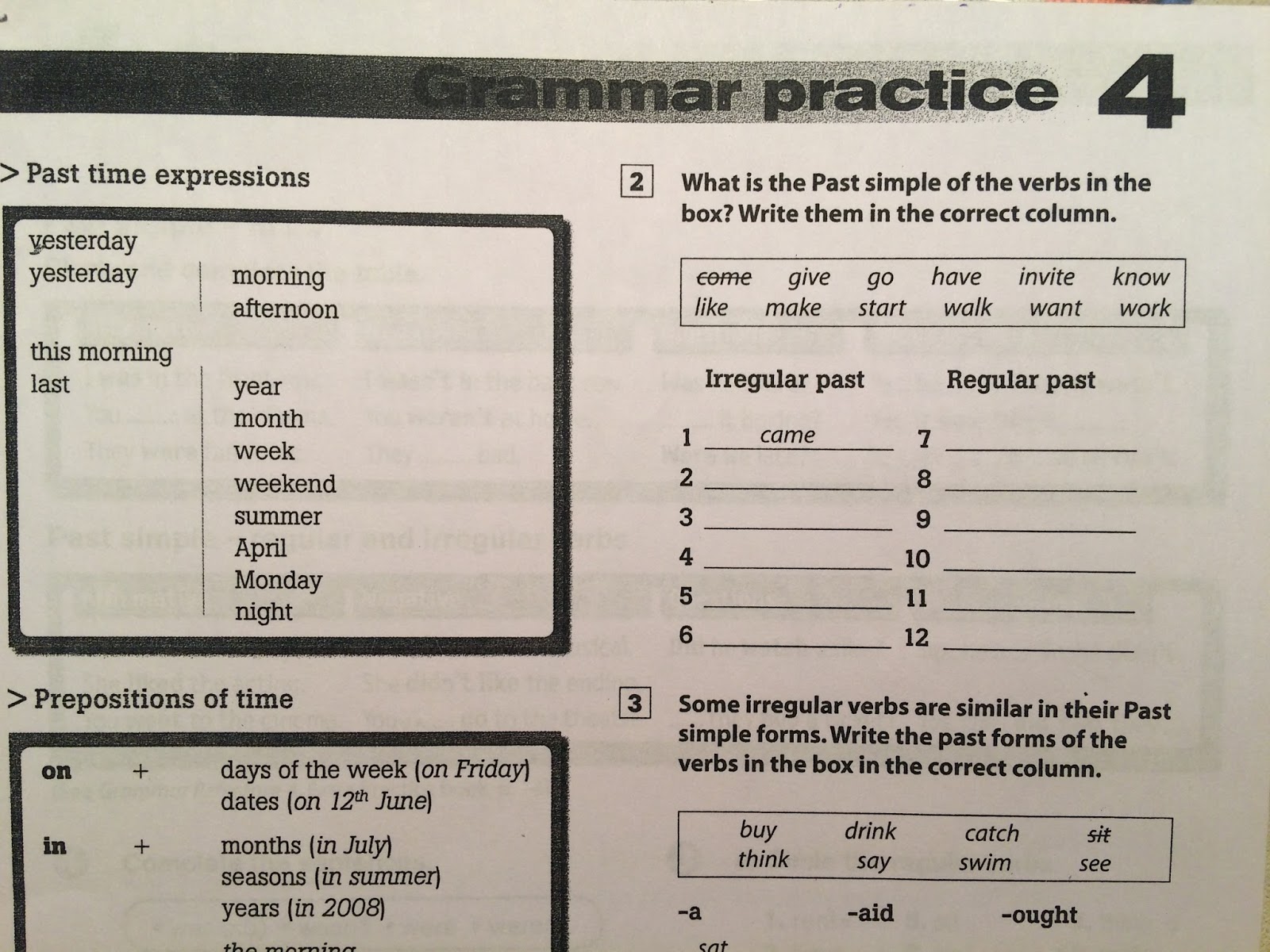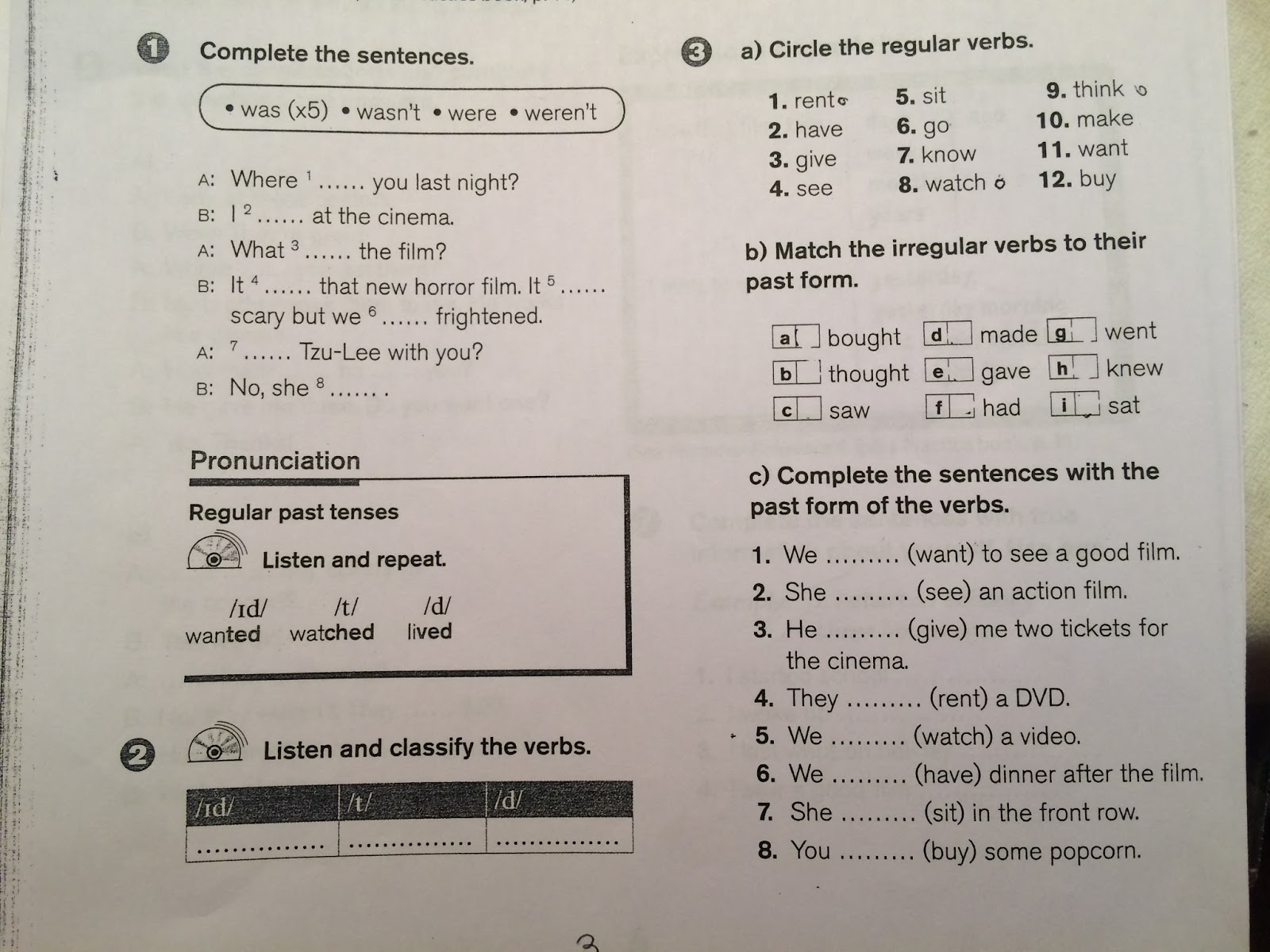Estimados,
Les dejo aquí las fotocopias con la explicación teórica del Simple Past.
Son las que les deje hace un tiempo para que saquen fotocopias.
Buen fin de semana.
sábado, 21 de mayo de 2016
viernes, 20 de mayo de 2016
Reading Comprehension Exercise 20/05
PAST SIMPLE Reading comprehension
Ben’s day.
When I woke up this morning, I found my dog, Fox, waiting for me. He wanted me to take him for a walk. I was too hungry, so first I had breakfast.I had a glass of milk and a piece of toast. Then I washed my teeth and puton a track-suit and a heavy coat, because it was really cold outside. Fox was already impatient. We both went out, and walked to the park near home. He ran and jumped, and pursued some passers-by. He also destroyed some pieces of furniture somebody left on the road. I sat on a bench all the time,wishing I could be inside my warm bed. When my hands were frozen, I decided it was time to go back home. Fox didn’t want to, but I pulled hardand I managed to take him back. When we arrived at the front door, I realized I didn’t have my keys with me, so we stayed out in the cold formore than an hour! Fox was happy, but I was late for work!
1.Write all the verbs you find in the past simple tense. Which of them are regular? Which are irregular? Write the infinitive of the irregular verbs:
2.Answer the questions:
a.Who was happy to stay outside?
b.What did Ben do in the park?
c.What did Fox do in the park?
d.What did Ben have for breakfast?
e.What was the weather like?
f.What was Ben wearing?
g.When did Ben decide it was time to go home?
Adverbs of Frequency/Adverbios de Frecuencia-Explicación
Como hemos visto en la lección de la
semana pasada, la forma simple del presente, marcada por la terminación
–s en la 3ra persona del singular, se utiliza para hablar de situaciones
que occuren con cierta frecuencia. Muy a menudo, la frase contiene
también alguna expresión para indicar la repetición o periodicidad de la
situación.
Hay dos grandes categorías:
- Los adverbios de frecuencia
| 0% | |
| never | nunca |
| hardly ever | casi nunca |
| sometimes | a veces |
| often | frecuentemente |
| always | siempre |
| 100% |
Estos adverbios se
colocan siempre delante del verbo “principal”, es a decir, el verbo que
tiene un significado y que hace referencia a una acción. Por lo tanto
hay que aprender a distinguir entre el verbo principal y el auxiliar (do
/ does; don’t / doesn’t).
I always play tennis.
He doesn’t often go to the cinema.
Do you usually get up early at the weekend?
Cuidado con los adverbios never y hardly ever. Estas expresiones tienen un significado negativo en inglés y, si las utilizamos, la frase no podrá contener una negación.
He hardly ever goes to the cinema – No va casi nunca al cine. (en castellano, la doble negación es posible)
Hay una excepción a la regla: el verbo TO BE. Con este verbo, los adverbios de frecuencia se sitúan siempre detrás.
I’m often happy.
He isn’t always at home.
- Las expresiones de frecuencia como on (Mondays…), in the (morning/afternoon/evening),at night, at the weekend, in (July…)
Normalmente estas expresiones se colocan
al final de la frase, aunque en algunas ocasiones también se pueden
colocar al principio de la frase.
I play tennis at the weekend.
In the morning, he gets up at 7 o’clock, he has a shower and he has breakfast.
martes, 17 de mayo de 2016
Ejercitación 17/05 Adverbs of Frequency
Ejercitacion 17/05
Ejercitacion 2:
Ejercitacion 2:
-
He listens to the radio. (often) __He often listens to the radio_________
-
They read a book. (sometimes)_________________________________
-
Pete gets angry. (never) ________________________________
-
Tom is very friendly. (usually) ________________________________
-
I take sugar in my coffee. (sometimes) ________________________________
-
Ramon and Frank are hungry. (often) ________________________________
-
My grandmother goes for a walk in the evening. (always) ___________________________
-
Walter helps his father in the kitchen. (usually) ________________________________
-
They watch TV in the afternoon. (never) ________________________________
- Christine smokes. (never) __________________________
Suscribirse a:
Comentarios (Atom)











